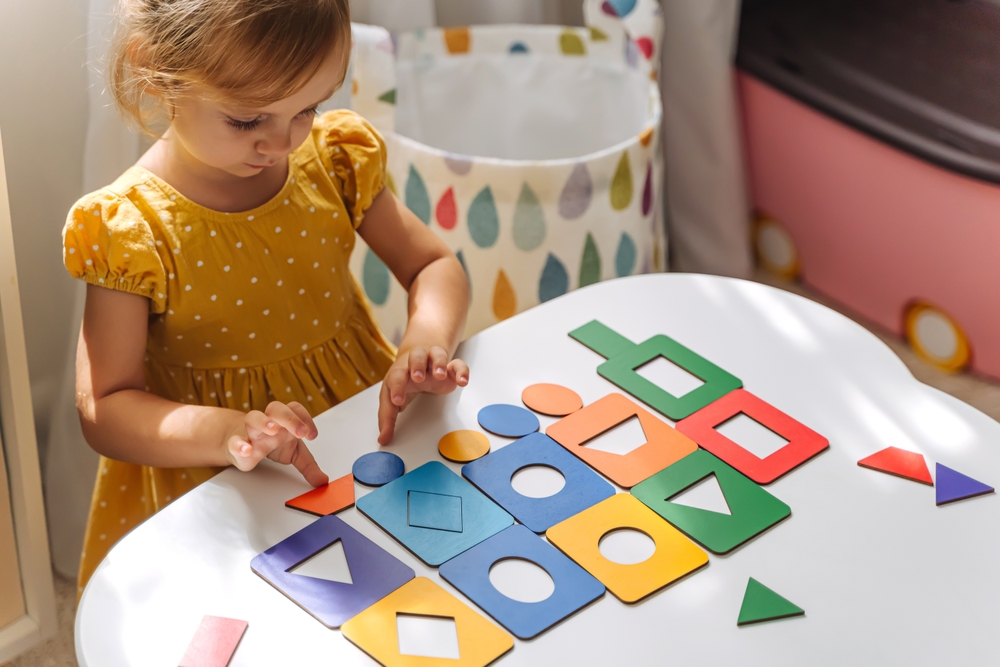
14 May The Importance of Play: How to Turn Play into Learning
The Importance of Play: How to Turn Play into Learning
Have you ever noticed that a child’s first instinct is to play? This simple, joyous act, often seen as just fun, holds the keys to unlock vast educational potential. At Sugar Mill Montessori School in Sugar Land, TX, we have harnessed this instinctual activity as a powerful learning tool, blending timeless Montessori methods with essential play-based learning and guided play experiences.
Get ready to see your little one play, laugh, and learn at Sugar Mill Montessori School! Schedule a tour today!
Understanding the Role of Play in Learning
Play is not just an activity; it’s a critical part of learning that helps children understand the world around them, develop social skills, and gain critical cognitive abilities. At Sugar Mill Montessori, we focus on “Guided Play,” which is a thoughtfully prepared approach where our educators set up environments and activities that lead to explorations and discoveries aligned with educational goals.
Why Guided Play?
- Encourages deeper learning: Structured play, or guided play, ensures children engage with specific educational outcomes in mind, yet they explore these concepts in their own creative and individual ways.
- Builds independence: Children make choices and learn to initiate learning activities on their own in a structured environment.
- Enhances social interaction: In a Montessori setting, children play and learn together, which naturally develops their interpersonal skills.
Guided play in the Montessori environment serves as more than just play; it’s a bridge to education.
Key Components of Montessori Play
Montessori play is unique in its approach and effectiveness. Here, we incorporate both guided activities and ample opportunities for children to engage in free play. This balance ensures that children are not only receiving direction but are also encouraged to explore their own creative impulses. Here’s how play transforms into learning:
- Structured Play Settings: Our classrooms are prepared meticulously with a wide range of educational toys and tools designed to support learning through play. Each material serves a specific educational purpose, promoting areas such as mathematics, language, sensory development, and practical life skills.
- Guided Interaction: Teachers play a role as guides rather than traditional instructors. They observe children’s interactions and step in with subtle guidance to propel deeper understanding and challenge their thinking process.
- Encouragement of Child-Initiated Play: While guided play is beneficial, the freedom of spontaneous play is equally vital. Our children are encouraged to choose their activities. This freedom fosters independence, decision-making, and creativity.
Benefits of Learning Through Play
- Cognitive Development: Learning through play enhances memory and stimulates the growth of the cerebral cortex.
- Social Skills: Children learn to negotiate, resolve conflicts, and learn self-advocacy skills.
- Emotional Growth: Play helps children work through their emotions and understand the world around them.
Incorporating Montessori Play at Home
Bringing Montessori principles into home play can be rewarding. Here are a few tips on how you can incorporate Montessori play at home:
- Create an organized space: Just like in our classrooms, providing a specific area at home where your children can play helps them to focus on the activity at hand.
- Choose developmentally appropriate toys: Select toys that match your child’s stage of development and that stimulate learning across different domains.
- Be a gentle guide: Occasionally, step in to challenge your child with open-ended questions that encourage problem-solving and critical thinking.
Frequently Asked Questions
Q: How can play help my child learn?
A: Play engages a child’s imagination, creativity, and problem-solving skills. Through activities like guided play, children explore concepts in a hands-on way, developing cognitive, emotional, and social abilities.
Q: How do I turn everyday play into learning opportunities for my child?
A: Incorporate toys or materials that stimulate specific skills (like puzzles for problem-solving or building blocks for spatial reasoning). You can also ask open-ended questions during play to encourage critical thinking.
Q: How do I know if my child is learning through play?
A: Signs of learning through play include improved problem-solving, development of new skills, enhanced creativity, better social interactions, and a growing curiosity to explore and learn more. Patience is key, as every child develops at their own pace.
Q: What role should a parent play during learning through play?
A: Parents can act as gentle guides by providing setups for activities, asking open-ended questions, modeling creativity, or encouraging exploration while still allowing the child freedom to lead the activity.
Q: Is turning play into learning suitable for all ages?
A: Yes! Play-based learning can be adapted for various developmental stages. For younger children, it often involves sensory exploration, while older children can engage in activities like strategy games or creative problem-solving play.
Connect with Sugar Mill Montessori School Today!
Choosing the right educational setting for your child is a significant decision. At Sugar Mill Montessori School, we believe that by leveraging guided play, we provide a unique educational experience that prepares children not just academically, but as holistic individuals ready to take on the world.
Are you interested in seeing how guided play and Montessori methods can benefit your child at an early stage? Contact us today to learn more about our programs and take a tour of our school. Together, let’s create a solid foundation for your child, filled with joyous learning and playful days.



No Comments